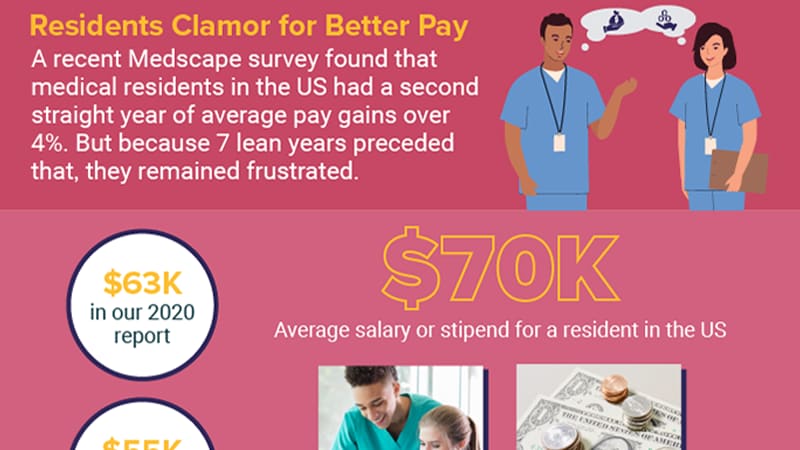Infographic Reveals Ongoing Frustration Among Medical Residents Over Stagnant Compensation
מושגי ליבה
Medical residents continue to feel undercompensated despite recent modest pay increases, highlighting the need for more substantial improvements in resident salaries.
תקציר
This infographic provides insights into the current state of medical resident compensation and the persistent frustration among residents regarding their pay.
The key highlights are:
- In the past 2 years, medical resident compensation has increased by over 4% annually, which may seem like progress.
- However, these increases came after 7 years of stagnant raises, leading 69% of residents to still feel undercompensated.
- The infographic presents the average salaries for medical residents, showcasing the gap between their compensation and the perceived value of their work.
- The data is drawn from the Medscape Resident Salary & Debt Report 2024, which provides a comprehensive look at the financial challenges faced by medical residents.
- The overall message is that while there have been some improvements in resident pay, the pace of change is still too slow, and residents continue to feel undervalued for the critical role they play in the healthcare system.
התאם אישית סיכום
כתוב מחדש עם AI
צור ציטוטים
תרגם מקור
לשפה אחרת
צור מפת חשיבה
מתוכן המקור
עבור למקור
www.medscape.com
Infographic: Frustration With Slow Progress on Resident Pay
סטטיסטיקה
The past 2 years saw medical resident compensation rise by more than 4% annually.
69% of residents said they feel undercompensated.
ציטוטים
"69% of residents said they feel undercompensated, meaning they're not yet willing to call it progress."
תובנות מפתח מזוקקות מ:
by Jon ב- www.medscape.com 09-17-2024
https://www.medscape.com/viewarticle/infographic-frustration-slow-progress-resident-pay-2024a1000gg0
שאלות מעמיקות
What factors contribute to the persistent gap between medical resident compensation and their perceived value in the healthcare system?
The persistent gap between medical resident compensation and their perceived value in the healthcare system can be attributed to several interrelated factors. Firstly, the historical context of medical training plays a significant role; for many years, the compensation for residents has lagged behind the rising costs of living and educational debt. Despite recent increases in pay, the 7 lean years prior have left many residents feeling that their compensation does not reflect their contributions to patient care and the healthcare system at large.
Secondly, the structure of funding for graduate medical education (GME) is a critical factor. Much of the funding comes from Medicare and state programs, which have not kept pace with inflation or the increasing demands placed on residents. This funding model often prioritizes cost containment over adequate compensation, leading to a perception of undercompensation among residents.
Additionally, the demanding nature of residency training, characterized by long hours and high-stress environments, exacerbates feelings of being undervalued. Many residents report that their workload and responsibilities do not align with their financial remuneration, contributing to a sense of frustration and dissatisfaction.
What policy changes or initiatives could be implemented to address the issue of medical resident undercompensation more effectively?
To address the issue of medical resident undercompensation more effectively, several policy changes and initiatives could be considered. One potential approach is to increase federal and state funding for GME programs, ensuring that compensation for residents reflects the rising costs of living and educational expenses. This could involve revising the Medicare GME payment formula to provide more equitable funding that accounts for regional cost variations.
Another initiative could be the establishment of minimum salary standards for residents, which would help to ensure that all residents receive a baseline level of compensation that is fair and sustainable. This could be coupled with efforts to enhance transparency in salary structures across different residency programs, allowing residents to make informed decisions about their training paths.
Furthermore, implementing loan forgiveness programs specifically targeted at residents who commit to working in underserved areas or specialties could alleviate some of the financial burdens they face. This would not only improve compensation perceptions but also address broader healthcare access issues.
How might the financial challenges faced by medical residents impact the overall quality of healthcare and the ability to attract and retain talented individuals in the medical profession?
The financial challenges faced by medical residents can have significant implications for the overall quality of healthcare and the ability to attract and retain talented individuals in the medical profession. When residents feel undercompensated, it can lead to increased stress and burnout, which negatively impacts their performance and the quality of care they provide to patients. High levels of dissatisfaction can also result in residents leaving the profession or choosing less demanding specialties, which can exacerbate existing shortages in critical areas of healthcare.
Moreover, the financial strain associated with low compensation can deter potential candidates from pursuing a career in medicine, particularly those from lower socioeconomic backgrounds who may be unable to take on substantial debt. This could lead to a less diverse workforce, which is essential for addressing the varied needs of the patient population.
In the long term, if the trend of undercompensation continues, it may result in a decline in the overall attractiveness of residency programs, making it challenging for healthcare systems to recruit and retain the best and brightest medical talent. This could ultimately compromise the quality of healthcare delivery and patient outcomes, highlighting the urgent need for reforms in resident compensation structures.
0
